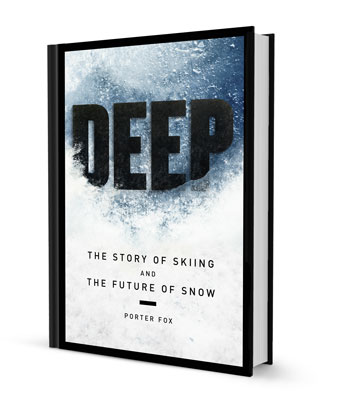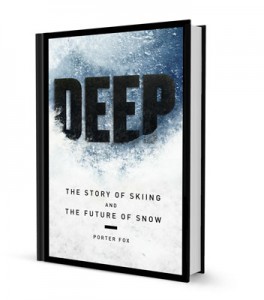
10 Feb The End of Snow?
 Porter Fox grew up in northern Maine, where he began skiing at age two – and writing at about the same time. He graduated in 1994 from Middlebury College, where he ski-patrolled for the Middlebury Snow Bowl and sold season passes for Mad River Glen. In 1999, Powder Magazine hired Fox and since then, he has skied on five continents and written more than 50 features for the magazine. His latest book is “Deep: The Story of Skiing and Future of Snow.”
Porter Fox grew up in northern Maine, where he began skiing at age two – and writing at about the same time. He graduated in 1994 from Middlebury College, where he ski-patrolled for the Middlebury Snow Bowl and sold season passes for Mad River Glen. In 1999, Powder Magazine hired Fox and since then, he has skied on five continents and written more than 50 features for the magazine. His latest book is “Deep: The Story of Skiing and Future of Snow.”
On January 27, Fox made Telluride the first stop on his book tour, appearing at Erik Dalton’s Jagged Edge for Ski-Lit, an author series put together by Dalton and Daiva Chesonis of Between the Covers Bookstore.
“Deep” captures the 8,000-year-old sport of skiing, the miracle of snow and the shocking truth of how climate change could wipe out both in the next 75 years.
Below, an article Fox posted as an OpED piece in the New York Times Sunday “Review.”
“OVER the next two weeks, hundreds of millions of people will watch Americans like Ted Ligety and Mikaela Shiffrin ski for gold on the downhill alpine course. Television crews will pan across epic vistas of the rugged Caucasus Mountains, draped with brilliant white ski slopes. What viewers might not see is the 16 million cubic feet of snow that was stored under insulated blankets last year to make sure those slopes remained white, or the hundreds of snow-making guns that have been running around the clock to keep them that way.
Officials canceled two Olympic test events last February in Sochi after several days of temperatures above 60 degrees Fahrenheit and a lack of snowfall had left ski trails bare and brown in spots. That situation led the climatologist Daniel Scott, a professor of global change and tourism at the University of Waterloo in Ontario, to analyze potential venues for future Winter Games. His thought was that with a rise in the average global temperature of more than 7 degrees Fahrenheit possible by 2100, there might not be that many snowy regions left in which to hold the Games. He concluded that of the 19 cities that have hosted the Winter Olympics, as few as 10 might be cold enough by midcentury to host them again. By 2100, that number shrinks to 6.
The planet has warmed 1.4 degrees Fahrenheit since the 1800s, and as a result, snow is melting. In the last 47 years, a million square miles of spring snow cover has disappeared from the Northern Hemisphere. Europe has lost half of its Alpine glacial ice since the 1850s, and if climate change is not reined in, two-thirds of European ski resorts will be likely to close by 2100.
The same could happen in the United States, where in the Northeast, more than half of the 103 ski resorts may no longer be viable in 30 years because of warmer winters. As for the Western part of the country, it will lose an estimated 25 to 100 percent of its snowpack by 2100 if greenhouse gas emissions are not curtailed — reducing the snowpack in Park City, Utah, to zero and relegating skiing to the top quarter of Ajax Mountain in Aspen.
The facts are straightforward: …”
Read on for more of the sobering story.



Sorry, the comment form is closed at this time.